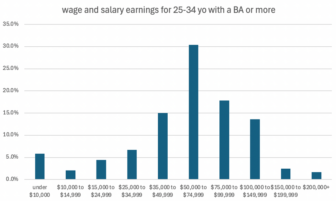Good news in the 2010 data on college attainment. Nationally 31% of 25-34 year olds have a four year degree or more. (Another 8% have a two year degree.) This is significant because, if sustained, it breaks a three decade long plateau in the proportion of adults with a four year degree which has pretty stubbornly stayed around 27%.
The Michigan news is not so good. The proportion of Michigan 25-34 year old with a four year degree is a little more than 27%. (8.6% have a two year degree.) Although there is no good data, the odds are high that our lagging the nation is a combination of fewer of those who grew up here getting a degree and Michigan being a net exporter of young talent.
What continues to be a challenge both here and around the country is the high number of students who start college and don’t earn a degree. Nationally more than 23% of 25-34 have some college but no degree, in Michigan it is almost 28%. Some didn’t go to college to get a degree. And some are still working on a degree. But most are drop outs. We need to make lowering the college drop out rate a priority just as we have with high schools. Getting higher college attainment is critical to both individuals economic well being but also to the well being of our communities.
A recent Education Week article offers some encouragement. It describes research trying to identify what skills are needed to succeed in college. The research assumes that high test scores on the ACT and SAT are not enough and may even not be what is most important. What they are finding is that so called soft skills like conscientiousness, agreeableness, emotional stability and openness to new experiences are reliable predictors of college success. And some, including ACT, are taking the next step and working on assessment systems to measure these skills.
The folks at Ford have been working on building these skills in high schools across the country for 20 years. The Ford PAS program is designed to build the kind of non academic skills that students will need to succeed in the 21st Century workplace. Turns out those skills are the same that you need to succeed in college.
We need to get smarter about this and then apply what we learn. The notion that the only measure of whether someone is ready for college is their score on the college entrance exam is almost certainly wrong. We need colleges, policy makers and the business community to work with high schools to develop the teaching and learning that will substantially increase the proportion of students leaving high school ready for college. And we need colleges to take serious the need to develop these skills with their students as well. The evidence seems to be clear that teaching content is not enough.






